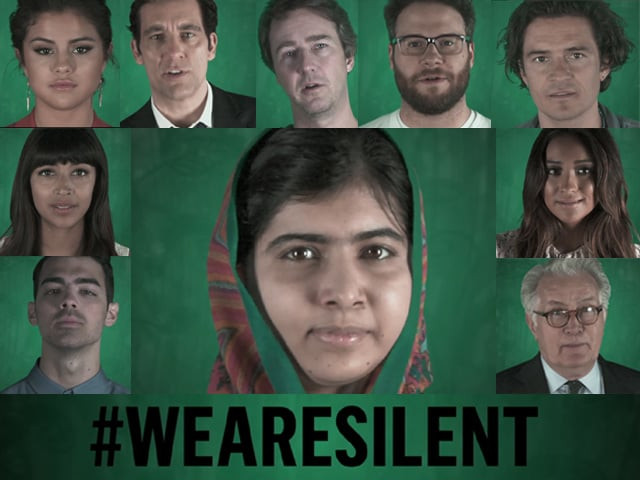By now, we have seen Malala be rightfully lauded around the world for her bravery and dedication to the cause of equal educational opportunity.
By now, we are mindful of the polarising sentiments that constitute a response to Malala’s name in this country.
So when a promotional video for the We Are Silent campaign, a joint venture between The Malala Fund and Free The Children, hit the airwaves last week, it was not surprising that the Malala story was once again being contextualised under the ‘we saved her’ narrative.
The minute-long-video features a string of celebrities literally serving as Malala’s voice, delivering parts of a first-person monologue from Malala’s perspective.
“I come from the Swat Valley in Pakistan,” starts off Selena Gomez.
It’s fairly innocuous so far.
“A region where rifles are fired to celebrate the birth of a son,” continues Clive Owen.
It’s entering a bit of a grey zone now.
“But daughters are hidden away behind a curtain,” finishes off Edward Norton.
And it only goes downhill from here.
Before I make any points about racial sensitivity and white privilege, allow me to offer a disclaimer.
I understand that this is promotional material put together to promote a good cause with the hope that using celebrities will garner attention.
I understand that it is common practice to use public figures to further a cause, even if in a mutually beneficial public relations move that may or may not be genuine.
I understand that the people featured in the video and those behind it only mean well and believe in promoting equal educational opportunity for girls.
There are 14 celebrities featured in the video, in addition to Malala – a very diverse group of people that includes a rapper, some comedians, an Academy Award winner, and a Jonas brother.
So if we were to break up the demographics, we have ten men, four women; nine Americans, two Canadians, two Brits, and an Australian; seven white folks, four African-Americans, one Latina, and two women of partial Asian descent.
Malala gets two seconds to say three words at the end of the video,
“I am Malala.”
There is something profoundly disconcerting about hearing Malala’s words delivered in a slightly sullen but palpably sympathetic tone by a white male actor who has likely never been to Pakistan, let alone the Swat Valley. Had this video come out in early 2013, it would have made sense to have celebrities recite her words in an effort to raise awareness. But today, Malala is a potent public figure in her own right, largely at the hands of Western media and politicians.
The girl penned a New York Times bestseller (she was virtually impossible to miss in the media during the press tour for the book) and was nominated for the Nobel Peace Prize in the last year alone. She may not be able to mobilise the throngs of teenage girls that Selena Gomez and a Jonas brother collectively can, but it is safe to say that Malala is famous enough to hold an audience’s attention for a minute-long advertisement.
The video absolutely increases its reach by employing some well-known faces, but it also disowns Malala of her own life story. And that is separate from the underlying racial and socio-economic subtext of having first-world dwellers describe the atrocities committed by the brown man in his native third-world land.
The other rich aspect of this video takes its roots from the American involvement in the Malala narrative, where the American polity and media offered support to Malala’s cause and public rapport. There are hundreds of other unnamed and faceless children (in Pakistan and elsewhere) whose human rights are being violated at the hands of American security forces. It is unlikely that these children will see the redemption that Malala has because their stories are a harder pill to swallow.
Malala’s story, grave as it is, can be packaged and run through news cycles as a feel-good narrative – good always trumps evil. It’s a story that has an end game where she is saved and given the chance to lead a better life. It’s a story that celebrities can genuinely get behind.
But at home, it’s a different story.
The Pakistani audience is not only cynical but also has a sweet spot for a juicy conspiracy theory. No matter how noble Malala’s cause may be, there will always be a steady, albeit wrong, portion of the audience that sees her as an American puppet.
So, to whoever had the bright idea to air a commercial featuring a crop of Hollywood stars in support of Malala on Pakistani television, job well done!
Not only did you miss the intended target audience by three continents, you also managed to delegitimise a worthy cause.



COMMENTS
Comments are moderated and generally will be posted if they are on-topic and not abusive.
For more information, please see our Comments FAQ